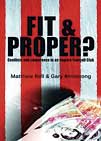 Conflicts and Conscience in an English Football Club
Conflicts and Conscience in an English Football Club
by Matthew Bell & Gary Armstrong
Peakpublish, £16.99
Reviewed by Ian Rands
From WSC 292 June 2011
A book detailing the comings and goings of the Sheffield United boardroom over the last 30 years may not seem to have universal appeal. But while stories of mismanagement and its fallout are familiar to a large number of football fans, this tale warrants further telling due to the extraordinary cast of characters. These include the country's biggest white-collar fraudster, an Iraqi businessman later to undergo gender realignment before subsequent reversal, a chairman subject to an international arrest warrant, a fugitive still on the run from Interpol and a London socialite known as "The Count" with indirect connections to Libyan arms dealers.
With criminal proceedings related to some of the topics still being discussed, the authors may have been constrained in what they can say, but there are several revelations. One notable example refers to events in early 1998. With United playing great football and in a strong league position they sold strikers Brian Deane and Jan Age Fjortoft on the same day. A consequence of a wage bill that was unsustainable on the crowds and income streams at the time, the panic sale contributed to the subsequent resignation of manager Nigel Spackman and a dip in form that saw the club scrape into the play-offs, where they were defeated by Sunderland.
The book reveals the true extent of the club's financial commitments, with the combined annual wage bill for Deane and Dean Saunders higher than that of Dave Bassett's entire squad three years earlier. Boardroom interference and misinformation is also shown to be a contributory factor in the departure of two other managers, Adrian Heath and Steve Bruce. The latter in particular is shown in a more positive light than many fans would have previously viewed him when the full facts regarding his departure are laid out.
The authors bring matters to a close in late 2010 with the property crash having damaged majority shareholder Kevin McCabe's global business empire. Amazingly, given the circumstances, United have avoided the ignominy of administration, with complacency being the biggest failing levelled at the various boardroom incumbents. When McCabe took over as chairman in 2008, the club was suffering due to investment in high-profile signings whose wages were unsustainable following failure to return to the Premier League. Player sales subsidised costs, the quality of the team diminished, attendances fell and the pattern repeated. Given that he had acknowledged the problem, United fans couldn't believe that McCabe would continue to make the same mistakes.
Sadly, that is most probably where the next chapter of this story will start. With the country's fifth largest city preparing to be home to two League One sides next season, many a neutral has asked how Sheffield football has reached such a state. Some of the answers are to be found in this book.